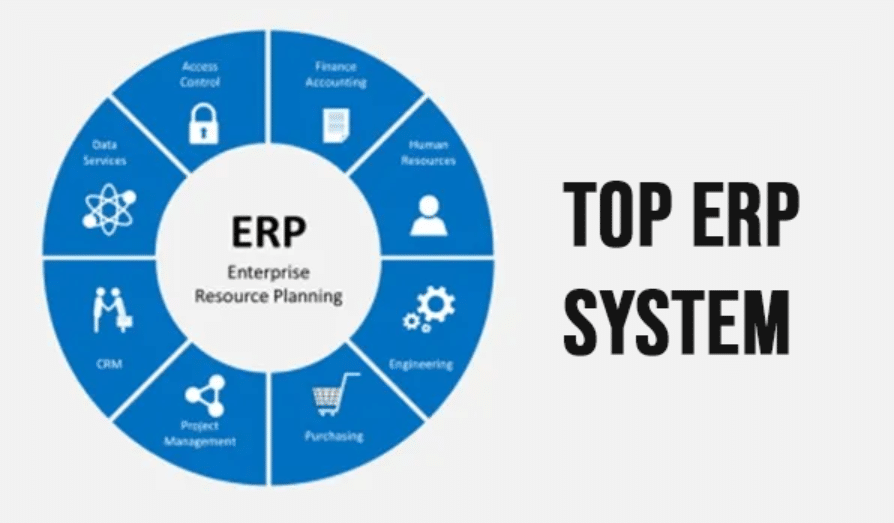In the fast-paced world of business, having the right ERP (Enterprise Resource Planning) system is crucial for efficient operations and strategic decision-making. As businesses of all sizes seek comprehensive solutions, we delve into the top ERP systems that are making waves in the market.

I. Introduction
A. The Role of ERP Systems
ERP systems serve as the backbone of modern businesses, integrating various functions into a centralized platform. From finance and human resources to supply chain and customer relations, these systems streamline operations for enhanced efficiency.
B. Importance of Choosing the Right ERP System
Selecting the right ERP system is a critical decision for businesses. The choice directly impacts day-to-day operations, scalability, and the ability to adapt to evolving industry demands.
II. SAP ERP
A. Overview
SAP ERP is a market leader, known for its robust functionality and versatility. It caters to businesses of all sizes and industries, providing solutions for finance, manufacturing, supply chain, and more.
B. Key Features
SAP ERP offers integrated modules for various business processes, including financial management, human capital management, and procurement. Its real-time analytics empower businesses with data-driven insights.
C. Pros
- Comprehensive functionality
- Scalability for businesses of all sizes
- Strong analytics and reporting capabilities
D. Cons
- Higher upfront costs
- Implementation can be complex for smaller businesses
III. Oracle NetSuite
A. Overview
Oracle NetSuite is a cloud-based ERP solution designed for scalability and flexibility. It is particularly popular among growing businesses seeking a unified platform for financials, CRM, and e-commerce.
B. Key Features
NetSuite’s key features include real-time visibility, automated processes, and scalability. Its cloud-based nature ensures accessibility from anywhere, fostering collaboration in today’s dynamic work environment.
C. Pros
- Cloud-based for flexibility and accessibility
- Comprehensive suite of applications
- Strong e-commerce capabilities
D. Cons
- Ongoing subscription costs
- Customization may require technical expertise
IV. Microsoft Dynamics 365
A. Overview
Microsoft Dynamics 365 is an integrated suite of business applications, combining ERP and CRM functionalities. It caters to diverse industries, providing modules for finance, sales, customer service, and more.
B. Key Features
Dynamics 365 offers seamless integration with Microsoft products, fostering collaboration and efficiency. Its modular structure allows businesses to tailor the system to their specific needs.
C. Pros
- Integration with Microsoft tools
- Modular structure for customization
- Unified platform for ERP and CRM
D. Cons
- Some modules may require additional licenses
- Initial setup and customization can be time-consuming
V. Odoo
A. Overview
Odoo is an open-source ERP solution known for its flexibility and user-friendly interface. It covers a wide range of business functions, including accounting, inventory management, and project management.
B. Key Features
Odoo’s modular design allows businesses to start with basic functionalities and scale up as needed. It also offers a marketplace of apps for additional features and customization.
C. Pros
- Open-source for flexibility
- User-friendly interface
- Extensive marketplace for add-on apps
D. Cons
- Limited support for complex manufacturing processes
- Some advanced features may require additional modules
VI. Infor ERP
A. Overview
Infor ERP is recognized for its industry-specific solutions, catering to sectors like manufacturing, distribution, and healthcare. It focuses on delivering tailored solutions that align with specific industry needs.
B. Key Features
Infor ERP offers a range of applications designed for industry-specific requirements. Its cloud-based and on-premise options provide flexibility for businesses with diverse preferences.
C. Pros
- Industry-specific solutions
- Flexible deployment options
- Robust support for complex supply chain needs
D. Cons
- User interface may be less intuitive for some users
- Customization can be challenging for non-technical users
VII. Epicor ERP
A. Overview
Epicor ERP targets mid-sized businesses with its industry-specific solutions. It covers manufacturing, distribution, retail, and services, providing tailored modules for each sector.
B. Key Features
Epicor’s focus on industry-specific solutions sets it apart. It offers modules like Epicor Kinetic for manufacturing, Epicor Eclipse for distribution, and Epicor Retail for retail businesses.
C. Pros
- Industry-specific focus
- Scalable for mid-sized businesses
- Robust reporting and analytics capabilities
D. Cons
- Limited pre-built integrations compared to some competitors
- Customization may require technical expertise
VIII. Choosing the Right ERP System
A. Consideration Factors
When choosing an ERP system, businesses should consider factors such as scalability, industry fit, ease of use, and long-term costs. A thorough assessment of specific needs is crucial for making an informed decision.
B. Popular ERP Options for Different Business Sizes
Explore ERP options tailored for different business sizes, including SAP Business One for small businesses, Oracle NetSuite for mid-sized businesses, and SAP S/4HANA for larger enterprises.
IX. Conclusion
A. Navigating the ERP Landscape In conclusion, the choice of an ERP system is a pivotal decision that can significantly impact a business’s efficiency and growth. Whether it’s the comprehensive functionality of SAP ERP, the scalability of Oracle NetSuite, the integration capabilities of Microsoft Dynamics 365, the flexibility of Odoo, the industry focus of Infor ERP, or the tailored solutions of Epicor ERP, businesses must navigate the ERP landscape wisely to thrive in today’s competitive environment.